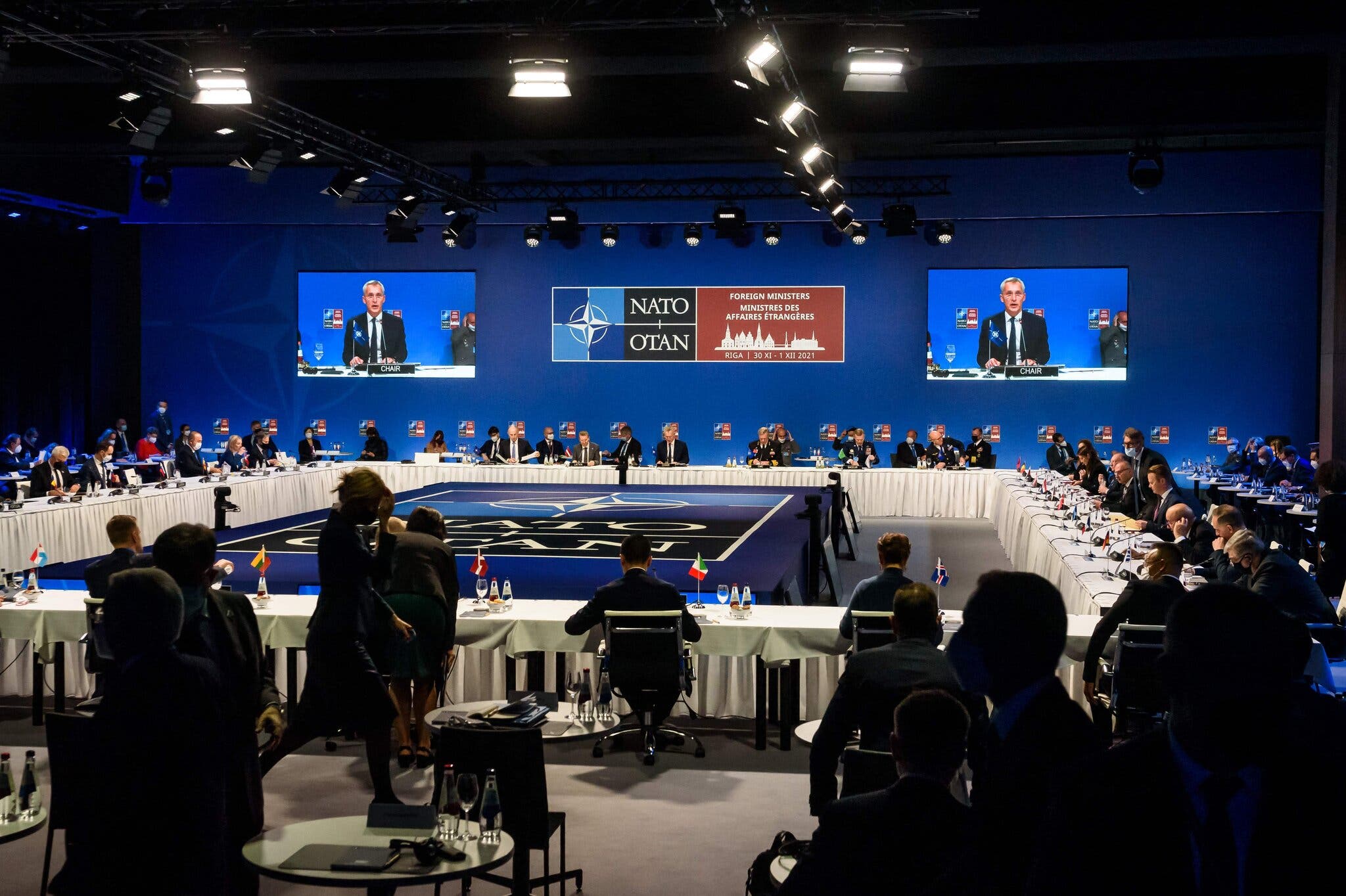Is Ukraine's NATO Membership Doomed? Trump's View

Table of Contents
The question of Ukraine's NATO membership hangs heavy in the air, particularly given Donald Trump's past pronouncements on the subject. This article delves into Trump's perspective, examining its potential impact on Ukraine's bid to join the alliance and the broader geopolitical landscape. We'll analyze the arguments for and against Ukrainian NATO membership, considering Trump's influence and the complexities of the situation.
Trump's Stance on Ukraine and NATO
Past Statements and Actions
Analyzing Trump's public statements and actions regarding Ukraine's NATO aspirations reveals a consistent pattern of skepticism. He frequently questioned the benefits of NATO expansion, particularly regarding Ukraine.
- Examples of skepticism: Trump repeatedly expressed concerns about the financial burden of defending Ukraine and other Eastern European nations within the NATO framework. He often questioned the commitment of other NATO members to collective defense.
- Instances of perceived opposition to Ukrainian sovereignty: While not explicitly endorsing Russian aggression, Trump's rhetoric often minimized Russia's actions in Ukraine, leading to concerns about his commitment to Ukrainian sovereignty and territorial integrity. His public praise of Vladimir Putin further fueled these anxieties.
- Contextualizing his statements: Trump's views must be understood within the broader context of his "America First" foreign policy, which prioritized transactional relationships over traditional alliances. His skepticism towards international organizations and multilateral agreements informed his approach to NATO and Ukraine's membership aspirations.
The "Transactional" Approach
Trump's transactional approach to foreign policy casts a long shadow over the prospect of Ukrainian NATO membership. His worldview emphasized bilateral deals and a cost-benefit analysis in international relations. This approach leaves Ukraine’s NATO bid vulnerable to subjective assessments of its strategic value.
- Examples of transactional deals: Trump's negotiations with other countries often involved explicit quid pro quo exchanges. This suggests that, under his administration, Ukraine's NATO membership would have hinged on tangible concessions rather than purely strategic considerations.
- Questioning Ukraine's value to NATO: Under a transactional framework, it's plausible that Ukraine might not have been deemed "worth the cost" for NATO membership, considering the potential risks and financial commitments involved.
- Consequences for Ukraine's security: A transactional approach undermines the principle of collective security that underpins NATO. This would leave Ukraine significantly more vulnerable to Russian aggression, jeopardizing its security and stability.
Geopolitical Implications of Trump's View
Impact on Ukraine's Security
Trump's stance on Ukraine's NATO membership has significant implications for the country's security. A rejection of Ukrainian membership, implicitly or explicitly endorsed by a US President, significantly weakens Ukraine’s deterrent against Russian aggression.
- Consequences of reduced NATO support: Reduced support from NATO would embolden Russia and potentially encourage further incursions into Ukrainian territory. Ukraine would face a greater risk of military attack without the collective defense guarantee provided by NATO membership.
- Ramifications for regional stability: A weakened Ukraine destabilizes the broader region, potentially leading to a cascading effect throughout Eastern Europe. This could result in increased tensions and a higher likelihood of conflict.
- Shift in the balance of power: Trump's stance could shift the regional power balance significantly in favor of Russia, undermining the broader security architecture of Europe and NATO itself.
NATO's Internal Divisions
Trump's views on Ukraine's NATO aspirations exacerbated existing divisions within the alliance. His skepticism towards NATO and his seemingly favorable treatment of Russia created considerable friction among member states.
- Differing opinions on Ukraine's application: NATO members hold diverse perspectives on Ukraine's membership, influenced by their geopolitical interests and relationships with both Ukraine and Russia. Some members were strongly supportive of Ukrainian membership, while others were more hesitant, owing to concerns about escalating tensions with Russia.
- Potential for further fragmentation: Trump's actions and rhetoric could further fragment the alliance, weakening its cohesion and effectiveness. His transactional approach undermined the principle of collective security, which is foundational to NATO's strength.
- Impact on future decision-making: The uncertainty generated by Trump's approach complicates future decisions on NATO expansion and could make it more difficult for the alliance to respond effectively to future challenges.
Counterarguments and Alternative Perspectives
Arguments for Ukrainian NATO Membership
Despite Trump's skepticism, strong arguments exist for Ukraine's NATO membership. Granting membership would provide significant strategic and security advantages, both for Ukraine and the alliance.
- Strengthening regional security: Ukraine's inclusion would bolster NATO's presence in Eastern Europe, acting as a deterrent to further Russian aggression and enhancing regional stability.
- Deterrence of Russian aggression: NATO membership would provide Ukraine with a strong security guarantee, significantly deterring potential Russian attacks.
- Promoting democratic values: NATO membership reinforces Ukraine's commitment to democratic values and strengthens the alliance's commitment to promoting democracy in the region.
Alternative Security Arrangements
If NATO membership remains unattainable, alternative security arrangements must be considered for Ukraine. These could provide a measure of protection against Russian aggression while avoiding the complexities and potential risks associated with full NATO membership.
- Enhanced bilateral partnerships: Strengthening bilateral security partnerships with individual NATO members, such as the US, UK, and Canada, could provide essential military and economic support.
- Increased military aid: Substantial increases in military aid, including advanced weaponry and training, could significantly boost Ukraine's defensive capabilities.
- Strengthened international sanctions: Imposing stronger international sanctions against Russia in response to any further aggression could serve as a powerful deterrent.
Conclusion
Donald Trump's stance on Ukraine's NATO membership was characterized by skepticism and a transactional approach to foreign policy. This approach raised serious concerns about Ukraine's security and the potential for increased instability in Eastern Europe. While strong arguments exist for Ukrainian NATO membership, including enhanced regional security and deterrence against Russian aggression, alternative security arrangements, such as enhanced bilateral partnerships and increased military aid, may be necessary if NATO membership remains elusive. The debate over Ukraine's NATO membership, particularly in light of Trump's perspective, remains crucial. Continue the discussion and share your thoughts on whether Ukraine's NATO aspirations are doomed or if alternative paths to security exist.

Featured Posts
-
 Trump Administrations Pressure Campaign Against Europes Ai Regulations
Apr 26, 2025
Trump Administrations Pressure Campaign Against Europes Ai Regulations
Apr 26, 2025 -
 American Battleground The Fight To Reclaim Power From The Worlds Richest
Apr 26, 2025
American Battleground The Fight To Reclaim Power From The Worlds Richest
Apr 26, 2025 -
 Ai Driven Podcast Creation Efficiently Processing Repetitive Scatological Data
Apr 26, 2025
Ai Driven Podcast Creation Efficiently Processing Repetitive Scatological Data
Apr 26, 2025 -
 The Long Shot Ahmed Hassaneins Bid For An Nfl Draft Spot
Apr 26, 2025
The Long Shot Ahmed Hassaneins Bid For An Nfl Draft Spot
Apr 26, 2025 -
 Us Port Fees To Hit Auto Carrier With Up To 70 Million
Apr 26, 2025
Us Port Fees To Hit Auto Carrier With Up To 70 Million
Apr 26, 2025
